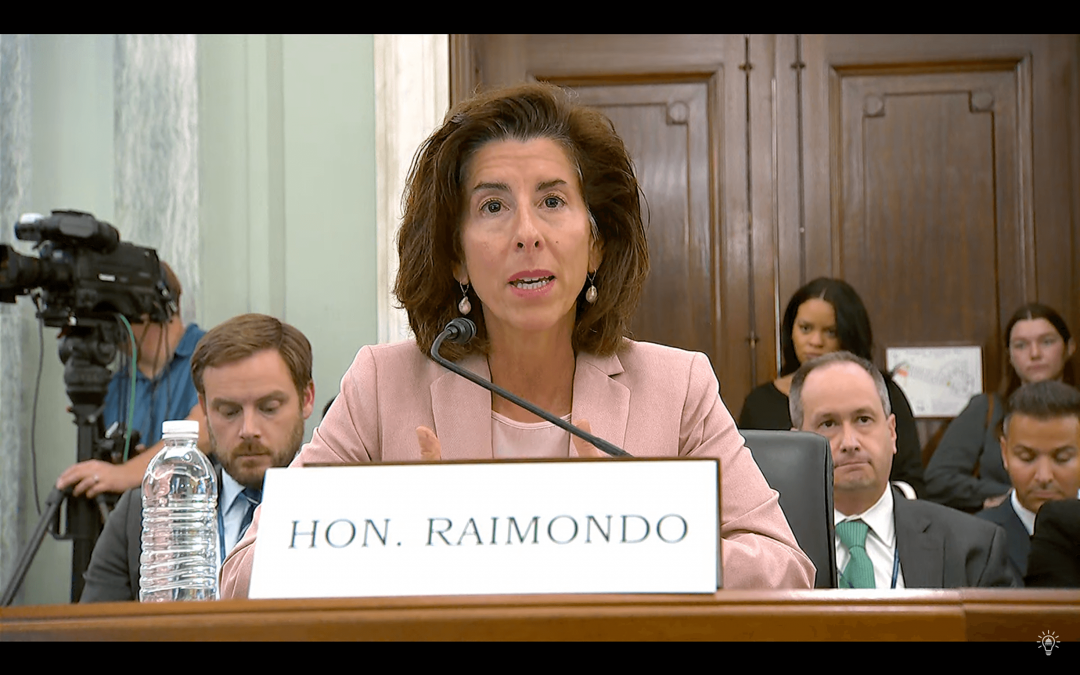WASHINGTON – Commerce Secretary Gina Raimondo told the Senate on Wednesday that recent reports on Huawei’s new smartphone are still “incredibly disturbing” and expressed support for legislation to strengthen her department’s ability to regulate foreign information and communications technology.
During Raimondo’s visit to China in August, Huawei began selling its newest phone, which reportedly contains a processor made by the Chinese chip manufacturer SMIC – an indication that China has made breakthroughs in producing advanced semiconductors domestically despite U.S. export controls on key manufacturing equipment.
When she testified before House members in September, Raimondo said she was upset by the reports of Huawei’s new phone, but she said the U.S. has no evidence that Huawei can produce the phone in mass volume.
During the hearing on Wednesday before the Senate Commerce, Science, and Technology Committee, Raimondo said the Department of Commerce is committed to investigate any allegations of companies evading U.S. export controls.
“The threat from China in 2023 is different than the Cold War threats of decades ago. It is technology. It is AI. It is moving fast,” she said.
Raimondo added that she supports legislation like the proposed RESTRICT Act, a bipartisan bill led by Sen. Mark Warner (D-Va.) that would give the Department of Commerce a new set of tools to address the national security risk of technology and software like Huawei’s telecommunication devices and TikTok; and the GUARD Act, a similar bill Sen. Maria Cantwell (D-Wash.), chair of the Commerce Committee, is drafting.
Raimondo and National Science Foundation Director Sethuraman Panchanathan also updated the senators on how the two agencies are overseeing the implementation of the CHIPS and Science Act, a landmark piece of legislation President Joe Biden signed into law in August 2022.
The CHIPS Act aims to direct more than $52 billion into the American semiconductor industry and research and development efforts, which the Department of Commerce oversees. It also provides a tax credit to companies for investing in chip manufacturing facilities and additional funding opportunities for science research in coordination with the NSF.
Since the Department of Commerce opened the application for the CHIPS Act incentives in February, the department has received more than 500 statements from companies interested in seeking the incentives, Raimondo said. She expects the department to announce the first recipients of the incentives and other grant awards this fall.
“I am moving as fast as I can, but it’s more important to get it right than move fast, and it depends on companies applying and having good applications,” Raimondo said.
Cantwell emphasized the need for the U.S. to have a resilient semiconductor supply chain in order to maintain its competitiveness in other technology, such as artificial intelligence, 5G network and quantum computing, all of which require a steady supply of chips.
“We know that our foreign adversaries are not waiting. We know that our strategic competitors are also moving ahead,” Cantwell said, urging the U.S. to “make sure that we are innovating and translating our science faster.”
Raimondo said the CHIPS Act includes explicit mechanisms to protect U.S. innovation and competitiveness. The bill prohibits federal fund recipients from investing in semiconductor facilities in “foreign countries of concern,” a list that includes China and Russia. The awardees are also barred from participating in joint research and technology licensing efforts with foreign entities that may threaten national security.
Republicans on the committee, however, seemed more focused on questioning the Department of Commerce’s guidelines on environmental protections and workplace equity and diversity.
Sen. J.D. Vance (R-Ohio) took issue with the Department of Commerce’s directives that applicants for the incentives must hire from diverse sources of talent and ensure workplace equity, goals he said are “counterproductive to the goal of bringing (the semiconductor) industry back to the United States in the first place.”
Raimondo pushed back. She said the workforce plan each applicant submits factors into the evaluation for awarding the incentives, and there are no mandates in exchange for federal money.
Sen. Ted Cruz (R-Texas), the committee’s ranking member, had recently sponsored an amendment to the latest Defense Authorization Act that would exempt certain CHIPS Act projects from National Environmental Policy Act review. Such a review can delay a project for several years, he said.
Raimondo said she welcomes Cruz’s amendment because it would streamline and speed up semiconductor projects, which have what she said are a “national security imperative.”
But she clarified that her stance does not signal a departure from environmental protection, and companies that apply for CHIPS Act incentives are still required to submit their plan for climate and environmental responsibility.
“(Environmental commitments aren’t) social policy. It’s good business.” Raimondo said in response to a question from Sen. Edward J. Markey (D-Mass.). ”Companies ought to design projects to minimize adverse impacts … from climate and the environment.”

